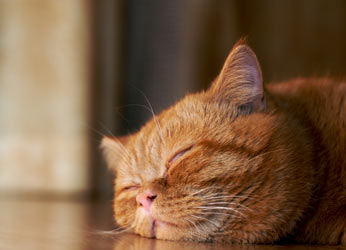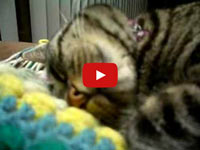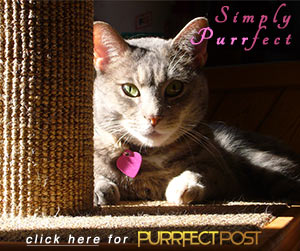Cats Snoring: Normal or Abnormal?

It's not a secret: cats love to sleep. They do it often, and they do it well. Sometimes you may hear your sweet little kitty making sleeping sounds that are reminiscent of a distant chainsaw. It may get you to wondering: is snoring normal in cats?
When Is Cat Snoring (Probably) Harmless?
Cats have sleep cycles like humans do. They have a rapid eye movement (REM) phase, where you may see twitching whiskers, "running" feet, and jerking facial muscles. Cats also have a deeper, non-REM phase of sleep, where they are fully-relaxed. This is the time when many people will hear their cat snoring.
If you only hear your cat snoring once in a while, there is probably nothing to be concerned about. If it happens all the time, but your cat has always done it and it isn't accompanied by any other signs of illness, it is probably not a medical concern. Below are examples of some cats that may snore often:
- Overweight cats have a higher tendency to snore. While this is not likely to be an immediate health concern, obesity can lead to many other serious health conditions. Take a look at this article for tips on helping your cat lose weight.
- Brachycephalic cat breeds snore more than other cats. These are cats with flatter faces, such as Persians. Their shortened nasal passages and elongated soft palates can lead to noisy sleeping.
- Your cat may just be sleeping in odd positions that leads to temporary snoring.
When Is Cat Snoring a Concern?
Snoring in cats is generally not a problem, but there are times when it could indicate the presence of a medical issue. If you notice any of the following signs accompanying your cat's snores, make an appointment with a veterinarian right away:
- Discharge from the eyes or nose, sneezing, or sores on the nose may all be indications of an upper respiratory infection. In this case, your cat may be snoring because of mucous in the nasal passages.
- Decreased or absent appetite or lethargy: these are always signs of illness in cats and need to be checked out.
-
Noises that sound like snoring while your cat is awake:
- Stertor: This is a low-pitches noise that sounds like a snore.
- Stridor: This is a high-pitched noise that can occur when your cat is either breathing in or breathing out.
- Wheezing: This is a high-pitched noise that occurs in the lungs during respiration.
- Snorting: this is a quick inspiration of air that occurs in the nose.
- Coughing
- Sitting with the neck extended and breathing rapidly: your cat should be seen by a veterinarian immediately if you see this behavior, as it indicates labored breathing.
- Breathing with the mouth open (panting) is abnormal in cats and should be evaluated by a veterinarian.
The above signs may indicate that one of the following conditions is present:
- Upper respiratory infection
- Feline asthma: this causes swelling of the tissues in the cat's lung passages. It may be secondary to allergies, parasites, obesity, or heart disease.
- Polyp or tumor in the nasal passages or sinuses
- Severe dental disease
- Heart disease
Most of the time, cat snoring is harmless and even cute. Just be aware of the signs that it is something more, and get your cat to the veterinarian right away.
Here's an especially adorable kitty with a super cute snore:

You May Also Like These Articles:
Pet Insurance: Peace of Mind for Your Cat's Health
How to Be Prepared for Your Cat's Veterinary Bills
Why Do Cats Do the Slow Eye Blink? : It's a Kitty "Eye Love You"!
Why Does My Neutered Cat Hump Things?
Dehydration in Cats: How Can You Tell If a Cat Is Dehydrated?
How To Know When Your Cat Is Sick
Notice: Ask-a-Vet is an affiliated service for those who wish to speak with a veterinary professional about their pet's specific condition. Initially, a bot will ask questions to determine the general nature of your concern. Then, you will be transferred to a human. There is a charge for the service if you choose to connect to a veterinarian. Ask-a-Vet is not manned by the staff or owners of CatHealth.com, and the advice given should not delay or replace a visit to your veterinarian.






